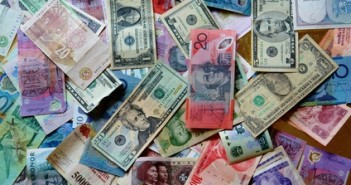The good news about a soaring USD is that it eases global trade tensions as it is the world’s main currency. But systematic devaluations of EUR and JPY are another matter and will force neighbouring countries to respond by pushing down the value of their currencies.
Japan and the Eurozone have become like black holes in the global economy desperate to suck in growth from where ever they can find it. Both struggle to grow domestically, suffer deflationary pressures and also want to tap into the greater economic vitality of their neighbours via exports.
As a result of neighbouring European and Asian countries trying to defend their export markets from EUR and JPY devaluations, USD could be pushed up even further – almost making it the only major currency with any appreciation potential.
South Korea has promised to respond to Japan’s devaluation efforts and there’s growing speculation that Taiwan and Singapore will also seek to weaken their currencies. In the Eurozone, the UK, Switzerland and Sweden are all placed in the firing line of the EUR’s devaluation with European Central Bank governor, Mario Draghi, not missing any opportunity to talk the currency down.
By Justin Pugsley, Markets Analyst MahiFX. Follow @MahiFX on twitter
The Bank of England is likely to increasingly talk GBP down in the light of a falling EUR and a weakening Eurozone economy, despite the UK’s good economic performance. The Swiss central bank will vigorously defend the EUR/CHF peg if necessary and the Swedish central bank has even talked about unconventional monetary policy, though admittedly more in light of potential deflation. Nonetheless, it too is concerned about events in the Eurozone.
JPY hammered by USD

Testing US patience
The big question of course is will US policy makers simply stand back while all these central banks slug it out in the forex markets? The US is far less dependent on international trade than many other countries and is experiencing robust domestic growth.
It appears the US ‘understands’ that the Eurozone and Japan are trying to stave off deflation and rekindle their economies (partly through devaluations), which is in US interests. Also, the ECB and BoJ are merely cribbing from the famous 2002 speech made by Ben Bernanke, who later headed up the US Federal Reserve, called Deflation: Making sure “it†doesn’t happen here.
This paragraph is particularly pertinent to the BoJ: “If we do fall into deflation, however, we can take comfort that the logic of the printing press example must assert itself, and sufficient injections of money will ultimately always reverse a deflation.â€
Nonetheless, the US is only likely to tolerate deliberate currency devaluations by other countries for so long, even if it is framed as a fight against deflation. A soaring USD will erode US competitiveness and could see the US current account deficit balloon, despite the country’s newly created energy bonanza. Also, central bankers tend not to like sharp currency moves.
A galloping USD is likely to eventually draw some strong vocal response from US policy makers, such as promising to keep interest rates low indefinitely in the context of currency appreciation and deflation risks, rather than just supporting jobs, for example.
So although the fundamentals continue to support a strengthening USD expect to see some sharp pull-backs (there are also a huge number of EUR shorts), most likely triggered by rhetoric from the Fed and possibly US government officials.
In our latest podcast, we dive into Australia, analyze the US jobs picture, talk about the punished pound and discuss the collapsing yen:
Subscribe to our podcast on iTunes.



